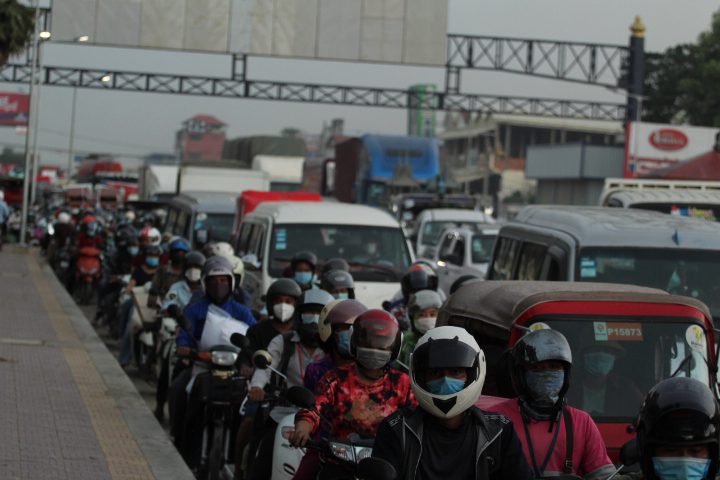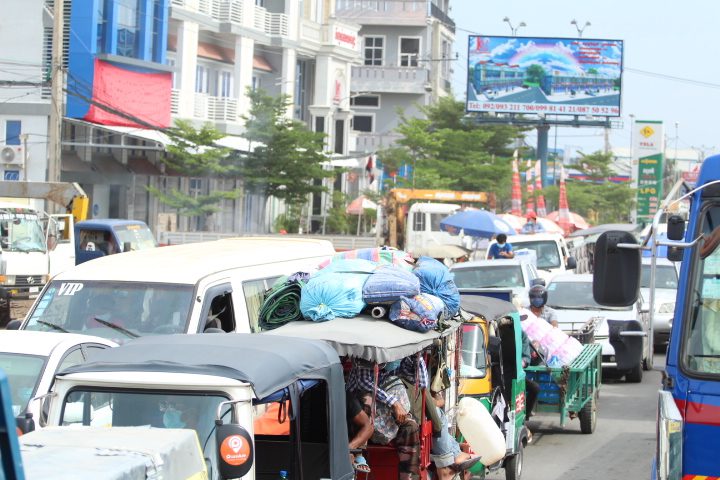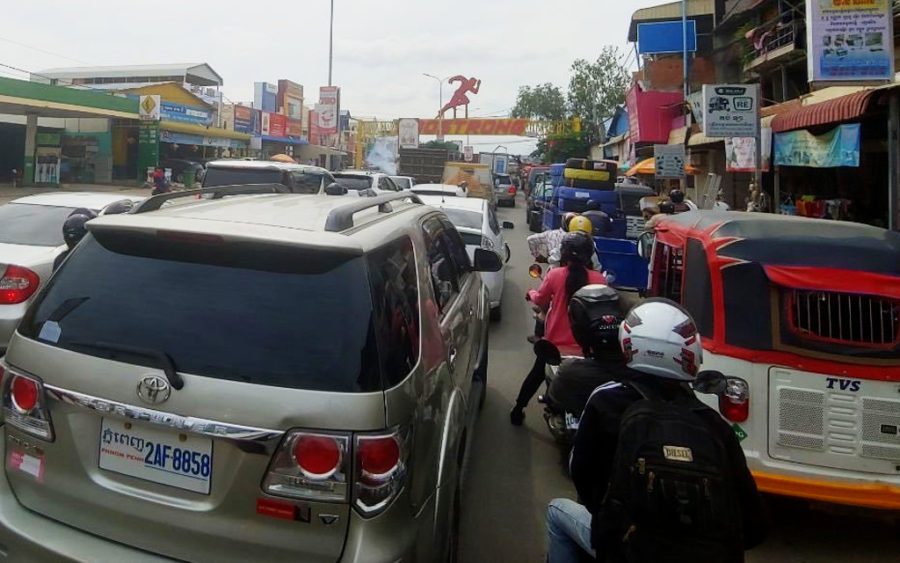Some provincial authorities are taking extra precautions with the hopes of preventing Covid-19 transmission after the government relaxed lockdowns in Phnom Penh and Takhmao and crowds departed the cities on Thursday.
Prime Minister Hun Sen, however, ordered provincial governors to avoid imposing too many restrictions, saying three weeks of lockdown had been difficult and it was now time to return to farming and other economic activities.
The resurgence of traffic out of the capital came as the Health Ministry stopped publicly releasing details of new Covid-19 cases, including how many were found in each province.
As red and orange zones were reduced across Phnom Penh, traffic jams were seen leading out of the city on National Road 3 from Pur Senchey district’s Choam Chao roundabout.
Ny Sova said he was traveling to his homeland in Kampong Speu province to visit his parents. By the afternoon the roads were packed, he said.
“I am worried about the Covid issue because there are a lot of people flooding out of their homes. I don’t know where they are from. I am in the yellow zone so I am not so worried,” Sova said.
Prak Mony, on his motorbike in the heat of the day on the same road, said he was traveling home to Kandal province. There were big trucks and all kinds of traffic, he said.
“I left at 10 a.m. Now it’s been almost two hours and I haven’t gotten out of the jam. Most of the traffic jams are from big trucks, and our roads are small, and when the trucks turn around, it’s taken almost half an hour,” Mony said.
Oeung Sineat, owner of the Bopha Monineath restaurant in Dangkao district’s Pong Toek commune, said there were many cars on National Road 3 from the morning.
“There are a lot of family vehicles, all are small cars. They are traveling to the provinces,” she said, though she added that road construction could be contributing to the congestion.
Rong, another restaurant owner along the road, said the traffic jam stretched 500 meters to 1 km.
“This morning, there’s been traffic jams for both cars and motorbikes and it has been about two or three hours and they are not moving,” he said.

Phnom Penh Municipal Police spokesperson San Sokseyha said there was a lot more movement of people since lockdown’s easing, but he was not sure about the reason for increased travel out of the city.
“We have seen that the situation on Russian Boulevard up to the Choam Chao roundabout and to Chompou Voan [in Pur Senchey] is very busy,” he said.
People could be commuting to work, not necessary traveling to the provinces, he said.
Asked whether he was worried about the large number of people going out, he said the important thing was that people were careful.
“I think it depends on people’s thinking because even if they go, they certainly think. People have started to have more of an understanding about how to be careful as well as be protected from infection,” Sokseyha said.
Provincial administrations said they were taking extra precautions as more people began to arrive from Phnom Penh.
The capital has seen the bulk of new Covid-19 cases in recent weeks, recording hundreds of cases every day.
Keng Bunna, deputy governor of Tbong Khmum province, said his province was maintaining vigilance about people traveling in, and all arrivals from outbreak areas like Phnom Penh and Kandal and Preah Sihanouk provinces would need to take a rapid Covid-19 test and go into quarantine.
The province had already experienced visitors from Phnom Penh transmitting Covid-19 to locals, so authorities were concerned, he said. Two villages in Dambe district were currently locked down due to such cases, he said.
“More people will come so we have to be careful. … There will be more coming,” Bunna said.
Takeo provincial administrative chief Meas Uy said provincial, district and commune authorities had met on Wednesday to discuss how to deal with arrivals.
The province is ready with quarantine centers in all communes and those who arrive from red zones will be placed there, he said. However, arrivals from yellow zones can quarantine at home.
“Our aim is to prevent anyone who might be positive from transmitting and causing problems in our areas,” Uy said, adding that the province has had more than 100 cases, including a death on Wednesday.
Veth Vathana, provincial administrative chief in Kampot, said traffic into the city had not increased significantly on Thursday, but more people could arrive over the weekend.
All arrivals must take health precautions, and those deemed higher risk would be made to take a rapid test and go into quarantine, Vathana said.
The province had already been preparing for rising visitors to tourism sites and other possibilities, he added.
Authorities were wary of an influx, and needed the public’s cooperation, he said.
“This work is not just for officials. It needs participation from everyone. People in all fields have to participate together so that we can avoid it,” Vathana said.
Currently, there are 14 Covid-19 patients in the province and all markets and restaurants are operating as usual, he said.

Kandal governor Kong Sophorn said there was nothing out of the ordinary about the flow of people traveling and transporting goods in and out of his province, though authorities were keeping watch for anything unusual.
Every individual needed to be cautious at this time, following health measures and trying to get vaccinated, Sophorn said.
“No one can monitor us all or monitor every minute. We have to be aware and try to avoid transmission. Covid-19 transmission has not stopped yet but we can control the Covid situation.”
On Thursday afternoon, Prime Minister Hun Sen ordered provincial governors to avoid quarantining all arrivals, as it would amount to closing down the country once again.
The lockdown over the past three weeks had already caused many difficulties and it was time for people to farm, Hun Sen said.
He suggested that quarantine apply only to those suspected of having Covid-19.
“His excellencies and her excellencies, take action to adjust your decisions, to avoid these decisions from going too far, which lead to the disturbance of people’s livelihoods and it will kill the economy,” he said. “Look at the whole forest rather than a single tree when solving the Covid issue in your provinces. Please look thoroughly at all economic and social aspects and general political issues.”
Since Wednesday, the Health Ministry has stopped issuing detailed Covid-19 data in favor of only total and new daily figures for cases, recoveries and deaths. Numbers per province have not been released, and details of deaths, such as age, gender and location, have also not been made available.
Hok Kimcheng, director-general of the ministry’s health technology department, told VOD on Thursday that he would discuss with a ministry technical team about case details, as well as a discrepancy in the daily and total recovery figures released by the ministry on Wednesday and Thursday.
Transparency International country director Pech Pisey said the government had been “quite transparent” thus far and it should continue to do so.
“Stopping giving details for Covid-19 cases to the public can limit public awareness about cases and increase contacts with infected individuals,” he said in a message. “It can also reduce people’s participation in preventing further contraction.”
“In [a] time of crisis, it’s critical that people engage in responding to the issues to stop the outbreak. Transparency and accountability are important to gain public trust in the government handling [of] the crisis.”
Additional reporting by Michael Dickison












